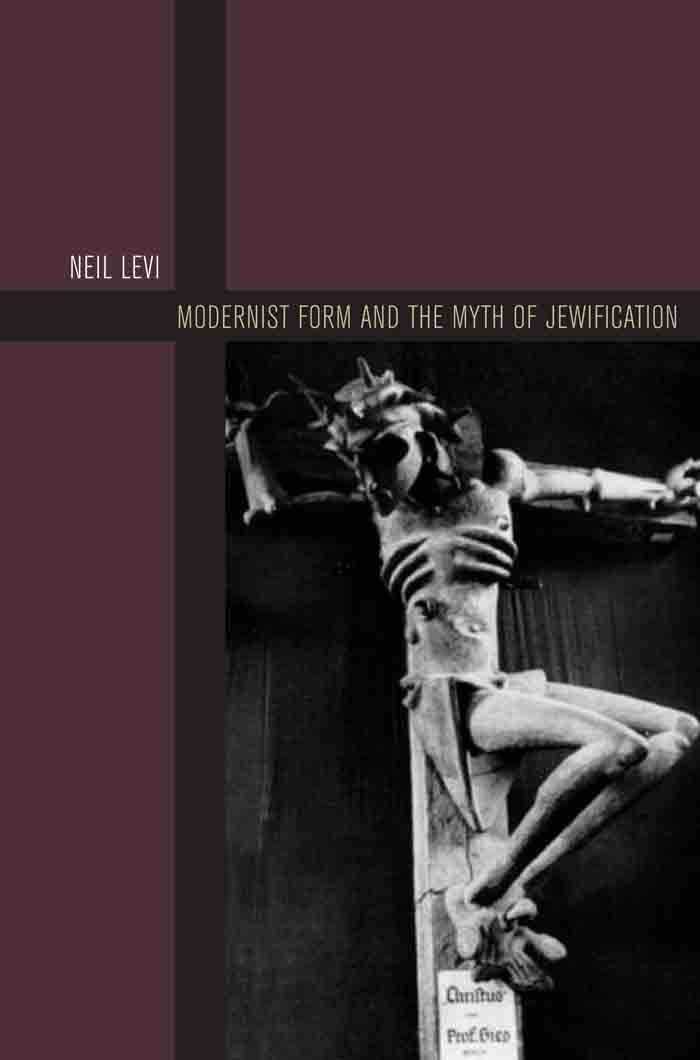Modernist Form and the Myth of Jewification

This book can be opened with

Why were modernist works of art, literature, and music that were neither by nor about Jews nevertheless interpreted as Jewish? In this book, Neil Levi explores how the antisemitic fantasy of a mobile, dangerous, contagious Jewish spirit unfolds in the antimodernist polemics of Richard Wagner, Max Nordau, Wyndham Lewis, and Louis-Ferdinand Celine, reaching its apotheosis in the notorious 1937 Nazi exhibition “Degenerate Art.” Levi then turns to James Joyce, Theodor W. Adorno, and Samuel Beckett, offering radical new interpretations of these modernist authors to show how each presents his own poetics as a self-conscious departure from the modern antisemitic imaginary.
Levi claims that, just as antisemites once feared their own contamination by a mobile, polluting Jewish spirit, so too much of postwar thought remains governed by the fear that it might be contaminated by the spirit of antisemitism. Thus he argues for the need to confront and work through our own fantasies and projections—not only about the figure of the Jew but also about that of the antisemite.
Modernist Form and the Myth of Jewification is an essential contribution to the recent attempt to analyze the phantasms and ideological formations that configured the Jew as a dirty or polluting influence that supposedly permeated modern culture and played a distinctive role in its aesthetic productions. Levi is addressing issues that go beyond the aesthetic while nonetheless playing an important role in it. His analysis is fine-tuned and convincing both as literary criticism and as ideology critique.
In this bold and original study, Neil Levi offers a radical unsettling of the relations between aesthetic modernism and the anti-Semitic imagination. Exploring the multiple fantasies and projections woven around notions of Judaism, Levi provides a deeply penetrating insight into modern literature’s complex negotiations with the antisemitic imaginary. This is a book no student of modernism should ignore.
Neil Levi’s brilliant reading of the relationship between Jewishness and modernism recodes the politics of modernism in a highly original and revealing way in a transnational field. From Wagner and Nordau via Wyndham Lewis and Joyce to Beckett and Adorno we are offered theoretically informed readings that cut through many misunderstandings of this riven field of fascism, modernism, and violence. It turns out that European literary modernism is deeply embedded in issues of Jewishness and anti-semitism. A must read for any scholar of modernism!
“Until I saw the cover of Neil Levi’s book, I had no idea that 'Jewification' was a real world. It certainly got picked up in spellcheck. But after I read just a few pages of Levi’s book, I knew exactly what he meant. The word, strange and twisted as it seems, is an apt way to describe a modern phenomenon that seems to defy description. Levi argues that 'both aesthetic modernism and modern anti-Semitism seek formal solutions to the problem of how to render intelligible the experience of modernity, and that the figure of the Jew is made to personify otherwise unrepresentable, disorienting experiences that enter a condition of chronic crisis in modernity'. Levi contents that many modern and avant-garde works of art neither by Jews nor about Jews can still be interpreted as Jewish, given the way they were conceived and the projections put upon them by those who conceive them and those who ‘appreciate’ them. Thus, we arrive at the Judaization of art or its Jewification.”——Erica Brown, Jewish Quarterly

